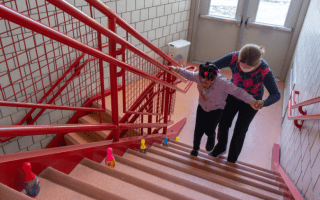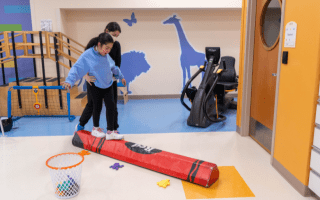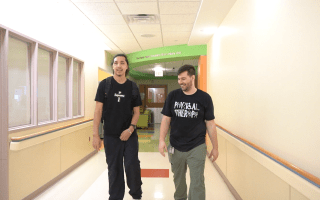Maryam's Story: Success with Specialized Feeding
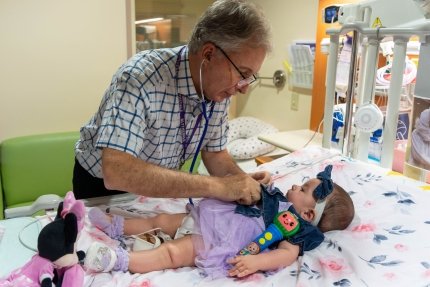
Maryam was born full-term in January at Jacobi Medical Center in the Bronx. At birth, she was noted to have hypotonia, or decreased muscle tone, and a poor ability to feed.
Less than a month later, Maryam was admitted to Blythedale Children's Hospital for complex medical care and specialized feeding. At first, Maryam required oral-gastric tube feedings.
"When Maryam first came to us, she was only taking about 10% of her feedings by mouth," said Dr. Dennis Davidson, attending neonatologist at Blythedale Children's Hospital. "And that needed to be done very carefully so that she did not aspirate milk into her lungs."
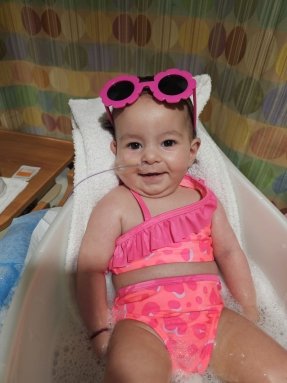
As the only pediatric specialty hospital in New York State, Blythedale is uniquely suited to evaluate and treat complex feeding difficulties in children with a team of pediatric specialists who work exclusively with medically fragile children. Maryam and her family began working with Marisa Portanova, MS, CCC-SLP, TSSLD, a speech language pathologist. Marisa is part of the Infant Feeding Evaluation Team and assessed Maryam's progress. Maryam was able to have a fiberoptic endoscopic evaluation of swallowing (FEES) study completed on site at Blythedale to assess her swallowing function. Following the evaluation, the team transitioned Maryam to a nasogastric tube.
"Maryam was able to receive that supplemental feeding through her nasogastric tube to receive the calories and nutrition she needed,” said Portanova. "This allowed us to focus on feeding therapy and the quality of her feeding by mouth."
Marisa provided Maryam's parents with ongoing training and education while trialing different nipples, flow rates, consistencies, and positions to optimize Maryam's feeding and ensure it was a positive experience for both the family and the baby.
"When a family first enters parenthood and they have a newborn, it's innate to want to nourish and feed their child."
"My goal is to help the family feel competent so that when they transition home they're confident with feeding their daughter," Portonova continued. "The training allows the parents to know how to read their infant's cues; to know when they're undergoing any stress, signs of fatigue, or signs of aspiration."
Maryam also received both occupational and physical therapies to strengthen her muscles. According to Michele Waldman, OTR/L, Maryam’s occupational therapist, the baby wasn't able to tolerate more than 15 minutes of occupational therapy a day and didn't reach for her toys as infants her age typically would.
"I work with her to facilitate the movement experiences that most babies her age are experiencing until she has the strength and endurance to begin participating on her own,” said Waldman.
Although a person with hypotonia or low tone is unable to change the makeup of their muscles, they can become stronger and increase their endurance so that the contraction of the muscles will become easier.
By initiating the movement for Maryam, moving arms and legs, and turning her head side to side, Maryam received the sensory input she needed to begin initiating the movements herself. This carried over in each therapy session, building her endurance and strengthening her muscles.
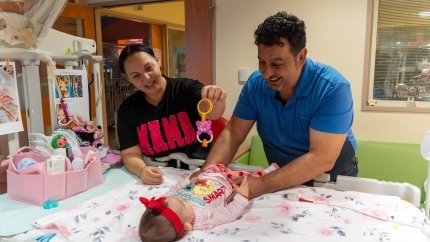
Maryam's parents also participated in training with Michele. Occupational therapists at Blythedale work collaboratively with each patient's family to help with the carryover of skills from hospital to home, ensuring continued progress after discharge.
Throughout Maryam’s stay, the clinical team rounded daily to assess progress from where she started to her current status. They worked with her family to also understand their goals for Maryam and what her next steps were.
Maryam was transitioned to a gastrostomy tube to ensure her caloric intake was where it should be, and enable her family to focus on keeping her feeding experience qualitative and positive. Maryam has advanced to taking most of her nutrition and hydration by mouth, either through a bottle or sitting up in a highchair for puree feedings. After making excellent progress, Maryam was happily discharged home at the end of July and will return to Blythedale for outpatient therapies.
